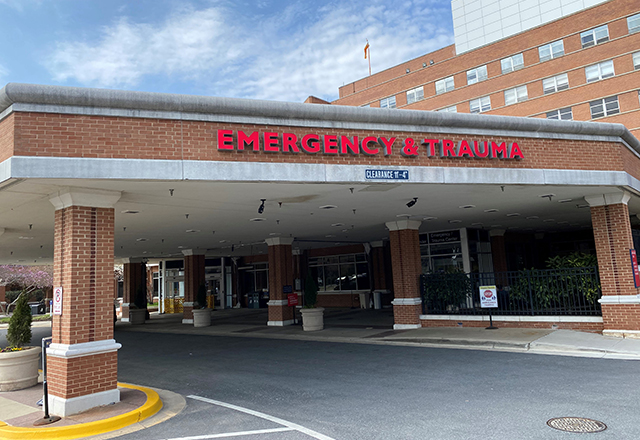Emergency and Trauma Care

Patient-Centered Care in the Region's Designated Trauma Center
Suburban Hospital is a Level II Trauma Center and is the state-designated trauma center for Montgomery County and the region. Suburban Hospital’s Emergency Department sees more than 43,000 patients per year. We have a separate, child-centric Pediatric Emergency Center, staffed 24 hours a day by an emergency pediatrician and specially trained pediatric medical staff.
Suburban’s Emergency/Trauma Department offers a high-tech facility with a specially trained, around-the-clock medical staff for treating life-threatening conditions and serious illnesses including:
- Trauma
- Stroke
- Cardiovascular disease
- Orthopedics
- Gastrointestinal
- General medical and surgical
- Respiratory
- Psychiatric
- Neurological
- Gynecological
- Dermatological
- ENT
- All-purpose first-aid
Rapid Care
Suburban Hospital’s multi-specialty team is well equipped to handle major medical emergencies including heart attacks and strokes, as well as minor and major trauma. Learn about our fast response and life-saving treatments for patients experiencing stroke.
Suburban's Emergency Department is also a designated Center of Excellence for stroke and ST-Elevation Myocardial Infarction (STEMI) – a severe heart attack in which at least one major artery is blocked.
Suburban's medical team delivers appropriate, timely and high quality care to all patients. We focus on connecting patients with the right type of care for their needs, guided by the core principles of patient-and family-centered care.
What to Expect During Your Visit
Check In
When you arrive at Suburban’s Emergency Room, please check in at the Triage window. Provide your name, date of birth and reason for visit. You will then receive an ID bracelet.
Triage
Listen for your name to be called by a Triage Nurse, who will perform an assessment and recommend treatment priority. The Triage Nurse will ask you for a brief medical history, a list of your medications and the reason for your visit.
Registration
Your name will be called by a Registrar, who will ask for your phone number, address, date of birth and insurance information. You will also be asked to sign several documents necessary for treatment.
Visitors
Please review the visitation guidelines for the most up-to-date information on care partner hours and any current restrictions due to the COVID-19 pandemic.
Diagnosis and Treatment
A nurse will review your medical history, medications, allergies and the current illness or injury.
Once a patient has been triaged, they are sent to the appropriate level of care based on their priority level. This may be a rapid assessment area for those with less urgent needs, or a resuscitation room for those with life-threatening conditions.
You may be moved several times throughout the course of your treatment. These movements help the Emergency Department take care of patients more quickly and make sure that everyone gets the right kind of care for their needs. This model has been shown to improve patient outcomes by reducing wait times and ensuring that patients receive appropriate care in a timely manner.
How do you determine the order in which patients are treated?
Suburban Hospital, like all hospitals, experiences variations in the number of patients who need treatment at any particular time. Depending on the number of other patients who need treatment and your particular condition, the waiting time can vary from a few minutes to more than an hour.
It is often medically necessary that patients who arrive after you are treated before you receive treatment. For example, a patient suspected of having a heart attack or stroke will be treated before a patient with a cut, sprain or broken bone. There are four treatment areas, and each area has its own queue. If you are waiting for treatment in the main treatment area and a person awaiting treatment in the minor care area arrives after you, that person may be taken before you if the minor care happens to have a shorter queue.
Our most serious patients typically arrive by helicopter or ambulance and may need immediate treatment. Please rest assured that those who arrive by ambulance and whose condition does not require immediate treatment will not be treated before those in the waiting room in more serious condition. If you have questions regarding the waiting time or you feel your condition has worsened, please inform a staff member at the Triage window.
Awards
In addition to national and state certifications, Suburban Hospital's Emergency Department has received numerous awards including the Emergency Nurses Association's Lantern Award ™ and Bethesda Magazine’s Best of Bethesda Readers' Poll for Best Emergency Room four consecutive times.
Parking
Please visit our patient care page for information about public transportation, the parking garage and the Suburban Hospital campus.
Billing
All patients are evaluated and treated regardless of their ability to pay. Physician groups and other services are billed separately from hospital emergency room charges. Please visit the billing and finance page for more information on financial assistance and payment plans.
Disaster Management
Suburban's Emergency Department team works collaboratively with federal, state and local authorities to prepare for and respond to natural and human disasters that may impact our community.
Meet Our Team
Learn more about the team of hospital-based physicians who are specially trained to serve adult or pediatric emergency department patients.
Adult Emergency Department
- Barton Leonard, MD, Director, Emergency Department
- Brendan Carmody, MD., Assistant Director, Emergency Department
- Matthew M. Leonard, MD
- Betty Dinarte, MD
- Golru Ghaffari, MD
- Emily Gordon, MD
- Andrew Markowski, M.D.
- Tracey Pyles, MD
- Shannon Reeve, MD
- Todd Templeman, MD
- Hasitha Wickramasinghe, MD
- Junior Williams, MD
The Shaw Family Pediatric Emergency Center
- Dominique Marie Foulkes, MD, Medical Director and Chairman of Pediatrics
- Lauren Chang, MD
- Nuria Carrillo, MD
- Saw Htun, MD
- Hirsh Komarow, MD
- Hongloan La, MD
- Inna London, MD
- Galina Nesterova, MD
- Sarojini Sonia Qasba, MD
- Vanessa Wolfman, MD
